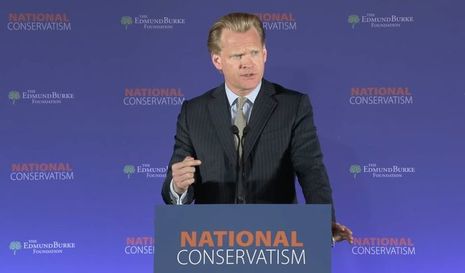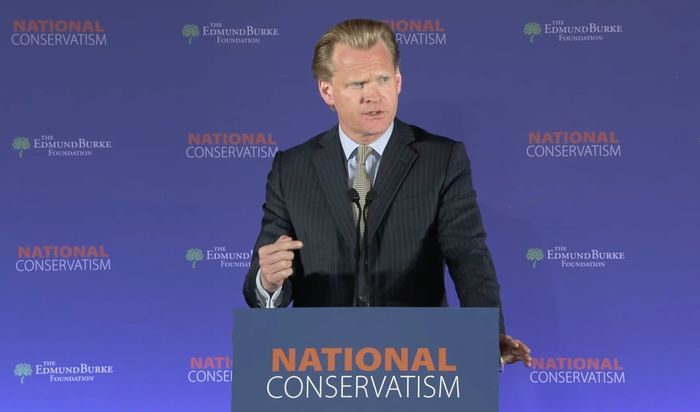Cambridge doesn’t need another Cofnas
Duncan Paterson argues that the recent appointment of James Orr, alongside his role as Professor in the Faculty of Divinity, as senior adviser to Reform UK must be condemned for what it is

The Oxford English Dictionary defines a ‘conflict of interest’ as: “A situation in which an individual may profit personally from decisions made in his or her official capacity.”
If you haven’t heard about it already, James Orr, Associate Professor of Philosophy of Religion at the Faculty of Divinity, was appointed as a senior adviser to Nigel Farage. Effectively, his job will be “talent” acquisition for the party, aiming to build a network of elite defectors from other parties, as well as within academia, business, and law. He’s even had his eye on “hundreds”of Cambridge students that “he thinks would make suitable allies,” in his role teaching five undergraduate papers, MPhil Course Director for Philosophy of Religion, and as PhD supervisor.
“The university needs to understand their responsibility in instances like these”
If this is not a conflict of interest, I don’t know what is. It should be the right of each individual student to come to form political views through an educated and unbiased presentation of the facts. Orr’s position of influence, as well as his public statements proposing to recruit Cambridge students, are testament to a violation of the student-teacher relationship and he cannot, as an anonymous member of the Divinity Faculty stated two years ago, in good faith uphold “the standards expected of an academic at a public university”.
The sheer quantity of issues surrounding this appointment boggles me. He has been put on record as using his influential position in one of the most prestigious universities in the world to recruit young people to his extreme side of politics, characterised by strict anti-abortion views under any circumstance, including rape and incest, calling immigrants ‘invaders’, and being best friends with US vice-president, J.D. Vance. The University needs to understand their responsibility in instances like these. If you were to look up James Orr online, the first sentence in nearly every article and biography about him is that he is a Cambridge professor.
The university has dealt with similar situations before. Nathan Cofnas, a former Emmanuel professor left after claiming that race was directly linked to intelligence, and Noah Carl, a researcher, was dismissed from his position because they understood that “there was a serious risk that Dr Carl’s appointment could lead, directly or indirectly, to the college being used as a platform to promote views that could incite racial or religious hatred”. Being placed alongside the Cambridge name brings legitimacy not only to Orr’s views, but also those of Reform UK. People might disagree, citing a slippery slope or association fallacies, but fundamentally he is using his position to publicly validate and promote extreme views, and Orr should not be allowed to profit off the back of a Faculty and a university that prides itself on inclusivity, diversity, and academic excellence.
Of course, the obvious rebuttal to my argument comes from the University Code of Practice on Freedom of Speech, which encourages “staff, students and visitors to engage in robust, challenging, evidence-based and civil debate as a core part of academic enquiry […] even if they find the viewpoints expressed to be disagreeable, unwelcome or distasteful”. Incidentally, this is the same Code of Practice that cleared Cofnas, accused of “abhorrent racism,” of any wrongdoing, and which came to the conclusion that his work did not amount to discrimination or harassment. Cofnas tried to defend his claims, that “under a true meritocracy, black people would disappear from almost all high-profile positions outside of sports and entertainment,” under the guise of academic study.
“Orr should not be allowed to profit off the back of a Faculty and a university that prides itself on inclusivity, diversity, and academic excellence”
Orr, when he condemned pro-Palestine demonstrators two years ago by saying “Import the Arab World, become the Arab World,” does not even try to hide his prejudices under the protection of academic free speech. If this was said by anyone other than a Cambridge professor, educated at Winchester College and Balliol College, Oxford, it would be condemned for the bigotry that it is. Instead, students are forced to stand by, despite protestations, as figures like Orr garner larger and more influential platforms.
So what can we do as students? Obviously, silencing views we do not agree with will render us guilty of the “cancel culture” firestorm that Reform UK, described by Orr himself as the ‘party of second chances’, are so obsessed with. We would simply be complicit in reinforcing the stereotype of free speech being unfairly persecuted by left-wing politics which gives such individuals so much ammunition in the first place. However, we should not stand by and let this be associated with this university, this deliberate movement away from decent human empathy and towards divisiveness and hate. The faculty, and the university itself, have a responsibility to its students to ensure that the people they employ, whilst they may have controversial views, are not allowed to have these views influence their decisions as a consequence of their being in a position of authority. I find it hard to believe that James Orr, public recruiter for Reform UK, will not allow himself to be tempted into abusing his position and action should be taken to prevent this abuse before it has a chance to take root.
 News / Colleges charge different rents for the same Castle Street accommodation2 March 2026
News / Colleges charge different rents for the same Castle Street accommodation2 March 2026 News / News in Brief: waterworks, wine woes, and workplace wins 1 March 2026
News / News in Brief: waterworks, wine woes, and workplace wins 1 March 2026 News / Climate activists protest for ‘ethical careers policy’1 March 2026
News / Climate activists protest for ‘ethical careers policy’1 March 2026 News / Angela Merkel among Cambridge honorary degree nominees27 February 2026
News / Angela Merkel among Cambridge honorary degree nominees27 February 2026 News / Private school teacher who lied about Cambridge degree barred from teaching27 February 2026
News / Private school teacher who lied about Cambridge degree barred from teaching27 February 2026









